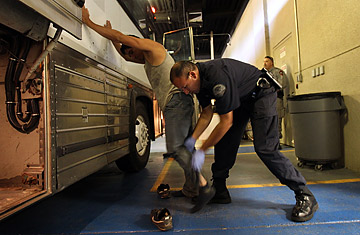
An undocumented immigrant is processed at an Immigration and Customs Enforcement center in Arizona
With an eye to the example of Arizona, Utah, which may have upwards of 110,000 undocumented aliens, may be taking the issue of illegal immigration into its own hands. Earlier this week, a group of 12 Utah legislators from the house and senate (three Democrats and nine Republicans) traveled to their controversial neighbor to the south to learn more about the impact of passing statewide immigration reforms.
The two-day trip, which the lawmakers paid for themselves, consisted of meetings with Arizona officials, business leaders, religious communities, heads of the public school system and, unsurprisingly, border-patrol agents. According to senate president Michael Waddoups, who was among the group, Utah legislators took note of the popular support for Arizona's controversial legislation. "They're trying to represent what the people want them to," says Waddoups. "That's American politics at its best — representing the constituents."
The trip comes approximately a month after Utah Representative Stephen Sandstrom released a draft of his Illegal Immigration Enforcement Act. The bill, likely to be just the first of many immigration bills headed for the January legislative session, is modeled on the Arizona law. Sandstrom's bill would also require local police officers to verify the immigration status of an arrested person if there were "reasonable suspicion the person is an illegal alien." According to Sandstrom, his bill enforces federal law on a state level but doesn't add any statutes, which he says makes it constitutionally sound. "It's about honoring the law and obeying the law," Sandstrom said during a press conference.
While Sandstrom says his bill has widespread support, it is already proving to be divisive, even within his party. Michael Clara, the state chair of the Utah Republican Hispanic Assembly, says the bill is part of a witch hunt and takes issue with it on a variety of grounds: for violating the Fourth Amendment guarantees against unreasonable searches, for its negative economic impact and for the fact that it punishes a single group of people and not the many others who are complicit in creating the current problem with undocumented workers. "We put the 'No Trespassing' sign at the border, and right behind, we put the 'Help Wanted' sign," Clara says.
Clara claims that Sandstrom's bill is not motivated by a grass-roots Utah movement but rather has been spearheaded by a national group known as FAIR (Federation for American Immigration Reform). "Unless I'm blind, I'm just not seeing a lot of support for this. I think it's just the fringes and the extreme right that supports what he is doing." Clara says. "There is more support nationally on what he is doing than what he is going to get locally. Sandstrom's bill is going nowhere. It's dead as far as I can see."
Other Utah legislators worry that the bill will be too costly. Democratic senator Luz Robles calls the bill "fiscally irresponsible." She expresses concerns for the direct costs associated with law enforcement's performing duties outside their jurisdiction, as well as the creation of facilities where detained individuals would be held, training of state employees to essentially act as immigration agents and the financial consequences to business communities and lost revenue from people leaving the state. Economic repercussions are already being felt in Arizona since it passed its law earlier this year.
But that doesn't mean Robles thinks such legislation shouldn't be attempted. She was one of the three Democrats to travel to Arizona to study its law, and she says she is currently working on her own immigration bill, which she plans to unveil next month.
